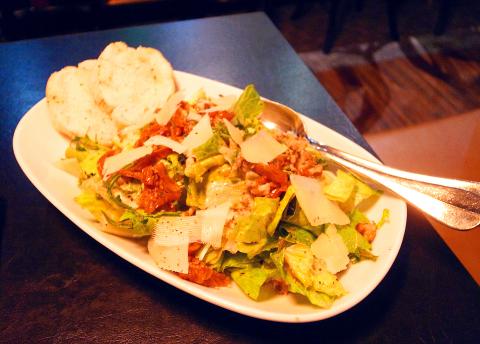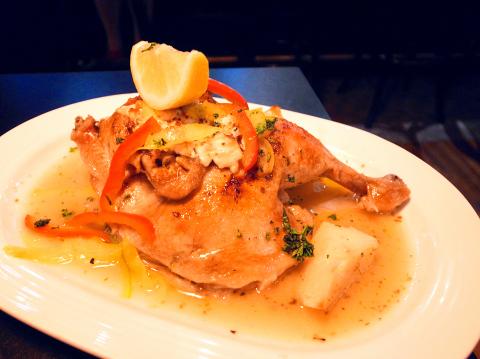On the premises where Toast Bar and Bistro used to stand, Yiamas Greeka Taverna brings a taste of Greece to a neighborhood dominated by Western-style restaurants such as Carnegie’s, The Diner (樂子) and Whalen’s. Opened earlier this month, the establishment’s menu, which mixes Greek-style dishes with classic brunch items, sandwiches, pasta, pizza and Mexican food, feels a bit odd, but, as we were told on a recent visit, its kitchen is currently undergoing a transition to become more Greek-focused. If the food keeps the same quality, Yiamas’ upcoming, revised menu is definitely something to look forward to.
Ambience-wise, the dimly lit restaurant has an intimate, relaxing comfort of a bar, accentuated by a slick palette of wooden brown, dark gray and white. Fluent in Mandarin and English, the wait staff appear both relaxed and attentive. With little knowledge of Greek cuisine, my dining companion and I relied on our server to make recommendations, which turned out to be just as delicious as promised.
We began our meal with rota salata (NT$320), said to be a popular Greek salad made up of fresh arugula, romaine and iceberg lettuce, sun-dried tomatoes, homemade candied walnuts served with shaved parmesan and Greek vinaigrette dressing. The dressing might be too sweet to some, but for people who claim to have a separate stomach for desserts like myself, it was nectar, and the candied walnuts were divine, adding a sense of excitement to the already cheerful mixture of flavors and textures.

Photo: Ho Yi, Taipei Times
Then came the souvlaki. Served with homemade pita bread, yogurt garlic sauce and roasted potato, Yiamas’ rendition of souvlaki features chicken (NT$290), lamb (NT$350) and beef tenderloin (NT$350). The beef we tried was flavorful and went well with the caramelized bell peppers and onions, though the meat seemed to be cooked to the level of medium-well rather than medium that we ordered. The yogurt garlic sauce was good, but in my opinion, the well-flavored, grilled delight needs no other seasoning than the slices of lemon served on the side.
Another dish that’s highly recommended is the kotoupolo lemonato (NT$380), or Greek roasted chicken. Seasoned with lemon, oregano and garlic, the bird was roasted to a succulent, tender perfection with even the breast moist, while the fruity, sour fragrance of the lemon wonderfully complements the otherwise rich plate. The large serving — half a chicken — is best shared among a group.
Satisfied with what we had and having no room left for dessert, my dining companion and I look forward to returning soon to try the restaurant’s lauded gyros, which comes in one of four options — chicken (NT$180), lamb (NT$190) and beef or pork tenderloin (NT$230). The gyros is served with tomatoes, red onions, tzatziki sauce (yogurt mixed with cucumbers, garlic and salt), pita bread and roasted potatoes. The moussaka (NT$220) also looks tempting with layers of ground meat and roasted eggplant topped with bechamel sauce.

Photo: Ho Yi, Taipei Times
For dessert, diners can choose from Greek standards such as baklava (NT$190), made with layers of filo pastry filled with walnuts, cashew nuts and pistachio nuts and sweetened with lemon honey or yiaourti me meli (NT$190), which is composed of Greek drained yogurt, honey and candied walnuts. For tipplers, the restaurant carries a wide selection of cocktails, beer, wine, whiskey and other spirits.
Good food and drinks aside, Yiamas also hosts comedy hours on a regular basis. An English-language stand-up comedy show is set to take place at 7:30pm on Saturday, featuring talents from Republic of Comedy — Taiwan Standup. Admission is NT$350 per person and includes one drink.

Photo: Ho Yi, Taipei Times

April 14 to April 20 In March 1947, Sising Katadrepan urged the government to drop the “high mountain people” (高山族) designation for Indigenous Taiwanese and refer to them as “Taiwan people” (台灣族). He considered the term derogatory, arguing that it made them sound like animals. The Taiwan Provincial Government agreed to stop using the term, stating that Indigenous Taiwanese suffered all sorts of discrimination and oppression under the Japanese and were forced to live in the mountains as outsiders to society. Now, under the new regime, they would be seen as equals, thus they should be henceforth

Last week, the the National Immigration Agency (NIA) told the legislature that more than 10,000 naturalized Taiwanese citizens from the People’s Republic of China (PRC) risked having their citizenship revoked if they failed to provide proof that they had renounced their Chinese household registration within the next three months. Renunciation is required under the Act Governing Relations Between the People of the Taiwan Area and the Mainland Area (臺灣地區與大陸地區人民關係條例), as amended in 2004, though it was only a legal requirement after 2000. Prior to that, it had been only an administrative requirement since the Nationality Act (國籍法) was established in

With over 80 works on display, this is Louise Bourgeois’ first solo show in Taiwan. Visitors are invited to traverse her world of love and hate, vengeance and acceptance, trauma and reconciliation. Dominating the entrance, the nine-foot-tall Crouching Spider (2003) greets visitors. The creature looms behind the glass facade, symbolic protector and gatekeeper to the intimate journey ahead. Bourgeois, best known for her giant spider sculptures, is one of the most influential artist of the twentieth century. Blending vulnerability and defiance through themes of sexuality, trauma and identity, her work reshaped the landscape of contemporary art with fearless honesty. “People are influenced by

Three big changes have transformed the landscape of Taiwan’s local patronage factions: Increasing Democratic Progressive Party (DPP) involvement, rising new factions and the Chinese Nationalist Party’s (KMT) significantly weakened control. GREEN FACTIONS It is said that “south of the Zhuoshui River (濁水溪), there is no blue-green divide,” meaning that from Yunlin County south there is no difference between KMT and DPP politicians. This is not always true, but there is more than a grain of truth to it. Traditionally, DPP factions are viewed as national entities, with their primary function to secure plum positions in the party and government. This is not unusual